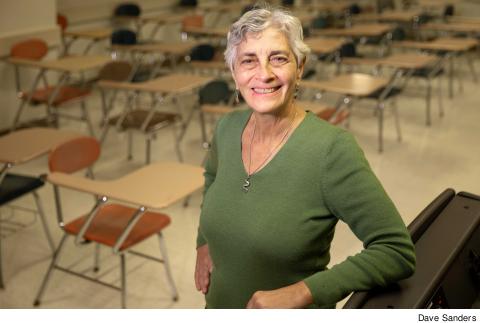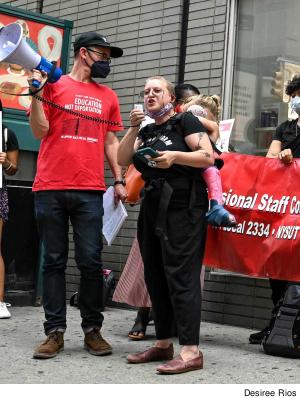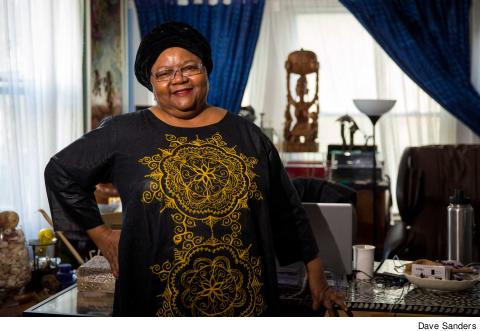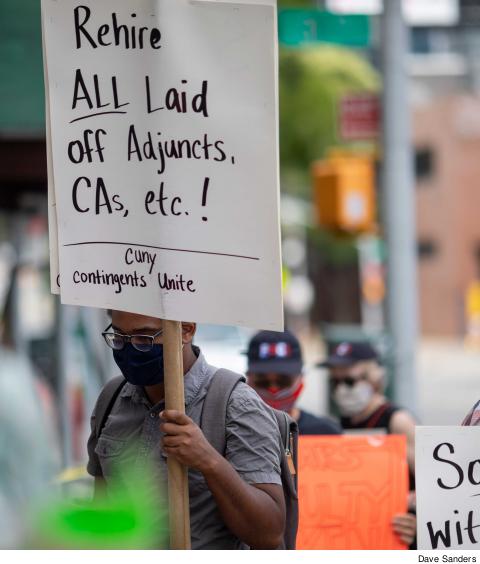CETs and adjuncts face continued layoffs
 |
On November 12, PSC activists told the City Council’s Committee on Higher Education that layoffs of part-time faculty and staff, as well as cuts to critical continuing education programs, continue to plague the university’s part-time workforce nearly two years after the start of the pandemic. Cuts have harmed students’ learning conditions, PSC activists said, and made it harder for the university to bounce back from enrollment declines associated with the pandemic.
While achieving more state funding for CUNY is a key component of the PSC’s strategic action plan, another critical component is to increase the city’s recurring funding.
Last year, Mayor Bill de Blasio proposed $77 million in cuts to CUNY, but thanks to intense PSC efforts with union allies on the New York City Council, the enacted budget restored $10 million for CUNY’s Accelerated Study in Associate Programs (ASAP). The PSC says that the city, the primary funder of CUNY’s two-year colleges, must do even more.
LAYOFFS CONTINUE
Winning justice for adjunct instructors and other part-time CUNY workers has long been a PSC priority. The last contract campaign aimed to lift teaching adjunct pay dramatically, and now, the PSC is pushing back hard against pandemic-induced course cancellations and the non-reappointments of adjunct faculty. Last year, hundreds of adjunct instructors were effectively laid off. The union is fighting these jobs cuts though various avenues.
College administrations have cited enrollment declines as a reason for downsizing. This Fall, for example, Continuing Education Teachers at Baruch College learned they would be out of a job in a terse email from their administration announcing the year-end closing of the college’s Division of Continuing and Professional Studies. The PSC fought similar cuts to the part-time workforce at The English Language Center (TELC) at LaGuardia Community College.
Increased city and state funding and progress on the New Deal for CUNY is vital to winning better protections and wage increases for part-time instructors, along with opportunities to secure full-time CUNY appointments.
What follows are excerpts from testimonials by PSC leaders and faculty activists before the Committee on Higher Education.
THE GIG ACADEMY
This year’s CUNY budget request, approved at the last trustees meeting, finally puts the University on a promising path after many years of accommodating to austerity and disinvestment. The CUNY administration has made a budget request worthy of the needs of students, faculty and staff.
 |
This hearing allows us to highlight a feature of CUNY’s budget request: the intention to “provide a defined career pathway for part-time teaching faculty” by creating 500 new full-time lecturer positions, an opportunity to offer conversion lines to CUNY teaching adjuncts.
CUNY relies heavily on adjunct labor to meet its instructional needs. In this respect, it resembles other public colleges and universities, where contingent appointments without job security have become the norm rather than the exception. But CUNY is a particularly stark instance of the problem. People talk about the “gig economy.” We have the “gig academy.”
As public resources for CUNY have diminished, the overreliance on adjunct labor has increased. The university effectively balances its budget on the backs of a large, underpaid, contingent workforce. In 2019–20, according to the [CUNY] Performance Management Process report, just 41% of undergraduate instruction per full-time equivalent (FTE) student was delivered by full-time faculty.
That means nearly 59% of instruction was delivered by adjuncts. This is the lowest rate of full-time instruction in at least five years. At the community colleges, full-time faculty teach a slightly higher percentage of courses than at the four-year colleges, but community colleges, too, rely heavily on underpaid adjuncts.
JOB SECURITY
We are hopeful that this budget request is a step in the right direction and look forward to working with the new mayoral administration and City Council to ensure the city portion is realized. We also look forward to working with CUNY on a method to implement the conversion lines that could move many of our members into permanent full-time work with benefits, while also protecting the jobs of our adjunct members who are not seeking full-time work.
This past June, you heard my testimony about the devastating impact COVID had on our members and the University. The difficulty of those times was sharpened when CUNY laid off approximately 2,800 adjunct teaching faculty. Thankfully, about 1,000 have been rehired. However, attrition also led to the loss of more than 500 full-time faculty and professional staff over the last 18 months. Many of those who remain face larger rosters in their virtual classes, a problematic result, as remote instruction benefits from smaller class size. To meet this demand for more and smaller classes, all of our laid-off colleagues should be able to return to work.
James Davis
PSC President
ATTACK ON PART-TIME
There are still several hundred adjuncts who were laid off at the start of the pandemic and haven’t yet been rehired. Many of those adjuncts lost not only their jobs, but their health insurance as well, while in the middle of a pandemic. It is simply shameful that CUNY has treated employees this way, particularly when those employees are the backbone of the CUNY educational system, many of whom have been working at CUNY for decades and effectively teach a full-time load.
Adjunct teachers and Continuing Education Teachers (CETs) in The English Language Center (TELC) at LaGuardia Community College faced similar cuts. Adjuncts were laid off and lost health insurance at the beginning of COVID and CET workers faced larger class sizes. After a very difficult fight, those adjunct workers were rehired and given health insurance, but now we are learning that they are being denied their contractually guaranteed office hour pay.
CONTINUING EDUCATION
Continuing education programs, which many part-timers work in, seem to have come under special attack from a CUNY administration [which seems to try and] make sense of low enrollment with laid-off workers and increased class sizes. Some programs have outright been canceled. The CET workers of the Baruch Continuing and Professional Studies program (CAPS) had classes with 37 to 41 students this semester – far larger than normal. And then, in the middle of this semester, without warning, they are being told that the program is ending and will not continue into the Spring, leaving workers without a job and students without a program.
When I walk around my neighborhood in the South Bronx and people see me wearing a CUNY sweater, every block someone new stops me to say they got a certificate at Bronx Community College, or they’re taking English language classes at Hostos Community College. We need to ensure that CUNY’s community colleges are fully staffed and ready for students to return after the pandemic is really over. They are essential to lift up students of color and low-income students, who most rely on CUNY’s community colleges. There is some decline in enrollment at community colleges, but how does that explain class sizes increasing while laid-off workers aren’t being rehired? Students are going to be coming back, and if these programs are gutted, what are they coming back to?
Our members who make these programs run deserve to be respected. They deserve a fair wage, reduced class sizes and better working conditions. In short, they need to be invested in.
I thank CUNY administration for requesting $103 million dollars [over last year’s budget] from the city budget. I urge CUNY to fight for more and to use these funds to support the part-time workers who need support in order to make CUNY what it is – a People’s University.
Rosa Squillacote
PSC Vice President for Part-Time Personnel
IMPORTANCE OF TELC
My passion motivated me to pursue two higher degrees, namely a second master’s and a PhD, and to keep a constant and consistent connection to my students both in the classroom – before, during and after class and through email.
To further my professional development, I have taught in teacher-training programs at New York University and The New School and I have worked as a teacher trainer/staff developer at the New York City Department of Education.
EXPERIENCED FACULTY
Given my status as one of the most senior faculty members at TELC, one who has contributed to the development of the program and has mentored junior faculty throughout the years, I was stunned to learn that in Fall 2020, for the first time in three and a half decades at LaGuardia, I was not given any classes to teach in TELC.
In Fall 2019, 35 adjuncts were teaching two classes each at TELC. Then in Fall 2020, 14 adjuncts were teaching only one class each. TELC was still a program, but not many adjuncts were teaching in TELC. Instead, new non-adjunct teachers were given classes previously taught by adjuncts.
In Fall 2021, enrollment went up considerably and most adjuncts who requested classes were teaching again. We, adjuncts, are asking that our experience, expertise and continual commitment to the program be granted their due. If classes are available, we are asking to be given priority in the distribution of these classes.
Linda Pelc
Adjunct Associate Professor, The English Language Center
LaGuardia Community College
MAKE TEACHING A PRIORITY
 |
If CUNY values all its professors, how is this demonstrated in how CUNY policy priorities are rolled out? According to CUNY’s testimony before this committee, part-time instructors’ employment is very much dependent on enrollment. Difficult decisions are made due to budget realities. Eighty-one percent of laid off [workers] had health insurance restored. In July 2020, a grant of $500,000 from a private foundation and $500,000 from CUNY’s operating budget was used for adjunct reappointments and 913 adjunct instructors were appointed. People who were let go were given priority. Online teaching training was also provided [to] 12,000 part-time or adjunct instructors. This year, 1,600 were not reappointed. What happens to those adjunct instructors? How do they pay their bills? How do they access health care? We must not lose sight of the plight of individuals who struggle to do their work under very difficult conditions that are now intensified by the COVID-19 pandemic.
Mojúbàolú Olúfúnké Okome
Executive Committee Member
CUNY University Faculty Senate
PART-TIME PLIGHT
 |
I urge CUNY to end adjunctification, to invite currently serving adjuncts into full-time positions and ensure that full timers teach at least 75% of all classes at CUNY.
It is very hard to turn a C student into a statesperson when you are living in your car or commuting five hours between campuses to earn enough to barely pay your bills. When you can never take a vacation, and in my case, rarely find time to read a book, the pain is visceral. Students need professors who are not too stressed to keep up with their disciplines, who have time to read student papers over and over, and who are paid to be available outside the strict one-hour-per-class office hour.
Brushed Aside
I’ve been scoffed at by full-time faculty for suggesting adjuncts do the same job they do. Yet we undertake scholarly research, serve the university and create works of art despite an almost complete lack of institutional support for our work. We are told our degrees are not good enough, even though there are many full-timers with the exact same qualifications.
I believe in public education. I believe that its purpose is to ensure that every New Yorker can reach their full potential through education. By running down our great public institutions, we are failing ourselves and our own future as well as our students’ [futures]. Education based on the whims and fashions of individuals and foundations will not provide this city with the knowledge and skills it needs to thrive. Actions speak louder than words. CUNY talks a good game on adjuncts, telling us that they value us, then paying us less than [what] full-time McDonald’s workers earn when the hours we must actually put in are added up.
Jillian Abbott
Adjunct Lecturer, English
York College

